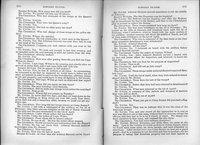698-699
| Previous Page | Next Page |

|
Senator Butler. How many men did you land?
Mr. Young. We landed 154 men and 10 officers.
The Chairman. Who had command of the troops at the Queen's palace.
Mr. Young. Nowlein.
The Chairman. They were the Queen's army?
Mr. Young. Yes.
The Chairman. She had no other army but that?
Mr. Young. No.
The Chairman. Who had charge of these troops at the police station?
Mr. Young. Wilson, the marshal.
The Chairman. He was commander in chief, next to the Queen?
Mr. Young. Yes. The Attorney-General was over him; but he was at the head of the troops.
The Chairman. I suppose you took rations with you over to the camp?
Mr. Young. Yes. We took only enough to last that evening, and we detailed cooks the next morning to send our rations from the ship.
The Chairman. Already cooked?
Mr. Young. Yes.
The Chairman. How soon after getting there did you first see Capt. Wiltse on shore?
Mr. Young. I saw Capt. Wiltse in the evening, just shortly after we arrived at Arion Hall, and I had some little talk with him.
Senator Butler. Did he appear in full uniform?
Mr. Young. Yes; he was in uniform at all times. In conversation he intimated to me that he supposed he would have to follow out all other precedents in order to prevent any incendiarism, pilfering, injury to life and property, and would have to stop all fighting in the streets.
The Chairman. Did Capt. Wiltse go back on shipboard that night?
Mr. Young. Yes.
The Chairman. When did you again see him there?
Mr. Young. The next morning—next forenoon.
The Chairman. Did he make any change in his orders the next day?
Mr. Young. None at all.
The Chairman. Where did you remain on Tuesday?
Mr. Young. In Arion Hall two days, and then we went down to the old Bishop building, on King street, not over 300 yards from there. Arion Hall was only a temporary affair, because we could not get anywhere else.
The Chairman. How long did the troops remain at Camp Boston?
Mr. Young. I left with a contingent of the artillery on the 3d of February; then there was one company on the 4th of March returned to the ship and the rest reembarked on the 1st of April.
The Chairman. Under whose orders did you leave?
Mr. Young. Under the orders of Capt. Wiltse.
The Chairman. From whom did he receive orders?
Mr. Young. No one at all. He was the senior officer present.
The Chairman. He did not receive any instructions from Mr. Blount?
Mr. Young. He was not there then. Admiral Skerrett received instructions from Mr. Blount?
The Chairman. That was later.
Mr. Young. That was the last of April.
Senator Butler. At what time did Admiral Skerrett arrive there?
|
Mr. Young. Admiral Skerrett arrived somewhere at out the middle of February.
Senator Butler. The San Francisco was his flagship?
Mr. Young. The Mohican was his flagship; and after the Mohican left he transferred his flag to the Boston, and then to the Philadelphia after it arrived to relieve the Boston.
The Chairman. These troops remained how long on shore?
Mr. Young. The first were withdrawn on the 3d of February. We landed on the 16th of January, and remained there until the 3d of February, when I withdrew, went on board with the main portion of the artillery; another company left about the middle of March, and all of them were withdrawn on the 1st of April.
The Chairman. Who was in command of the fleet there at the time these respective detachments were withdrawn?
Mr. Young. Admiral Skerrett.
The Chairman. All the time?
Mr. Young. No. I returned on board with the artillery before Admiral Skerrett arrived.
The Chairman. Under the orders of Captain Wiltse?
Mr. Young. Yes. After Admiral Skerrett arrived I landed with my men and junior officer for inspection, and returned on board the same day.
The Chairman. Did you land for the purpose of inspection?
Mr. Young. That is all.
The Chairman. And did not go into camp?
Mr. Young. No.
The Chairman. These troops under Admiral Skerrett remained there how long?
Mr. Young. Until the 1st of April, when they were ordered to return aboard ship by Mr. Blount.
The Chairman. Those were the last of the troops?
Mr. Young. Yes.
The Chairman. Before that they had been returned in detachments?
Mr. Young. Yes.
The Chairman. What men returned on the 1st of April?
Mr. Young. A company of blue jackets and company of marines that were still on shore.
The Chairman. On the 1st of April?
Mr. Young. Yes.
The Chairman. When you got to Camp Boston did you erect a flagstaff?
Mr. Young. Yes.
The Chairman. That was to indicate that it was the camp of the American troops?
Mr. Young. Yes; and also closed all the approaches to it, and no man was allowed out of that camp without leave of absence, except the officers, and they had to be in by 9 o'clock at night. We simply confined ourselves to that camp, and confined the men there.
The Chairman. You had strict military discipline?
Mr. Young. Military discipline, and drills there the same as any camp. Late in the evening we would go down to Palace Square, where we would have more room, for dress parade, and were witnessed by everybody. After we first went into Camp Boston we sent out a grand guard—that is, a company in one direction and then in another—for the purpose of seeing that American property had not been injured or
| Previous Page | Next Page |